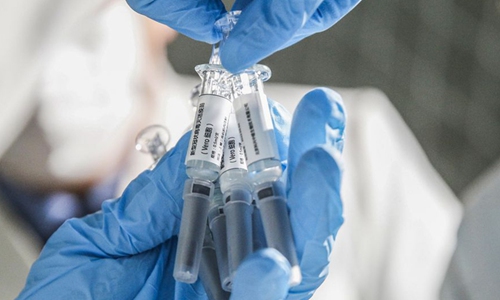Fosun and BioNTech jointly begin phase I clinical test of mRNA-based COVID-19 vaccine in China
Source: Global Times Published: 2020/8/5 21:32:26

Vaccine Photo:Xinhua
Shanghai-based pharmaceutical company Fosun Pharma and Germany-based BioNTech SE jointly announced on Wednesday that they have began phase I clinical tests of mRNA-based COVID-19 vaccine in China. The first 72 participants have been dosed with BNT162b1.
The phase 1 clinical trial in China will enroll 144 healthy individuals in total, so as to evaluate the safety and immunogenicity of the vaccine, as well as to confirm dose selection, according to a post on Fosun's official Wechat account on Wednesday. The trial could also pave the way for potential regulatory approval in China.
According to the post, participants will be dosed at Taizhou Clinical Phase1 Center, East China's Jiangsu Province.
Among the 144 healthy participants in the phase 1 clinical trial, the first group of participants will be healthy adults aged from 18 to 55 and the second will be healthy older people aged over 55. Participants will receive two injections, 21 days apart, of 10 microgrammes or 30 microgrammes of either the vaccine candidate or a placebo.
The trial is part of BioNTech's global development program. It will also compare and confirm the safety and immunogenicity profile from Chinese participants with that of Germany and the US.
BioNTech's phase 1/2 studies of the mRNA-based vaccine candidate are also ongoing in Germany and the US.
In March, Fosun announced that its subsidiary has formed a strategic cooperation with BioNTech to advance the latter's mRNA vaccine candidate BNT162 in China. The clinical test gained approval from Chinese regulatory authorities then.
Ai-Min Hui, president of Fosun's global research and development and chief medical officer, said that the Chinese study will initially evaluate nucleoside-modified messenger RNA (modRNA) candidate BNT162b1, one of two mRNA- based vaccine candidates that have received US Food and Drug Administration Fast Track designation.
So far, China has developed five types of vaccines, with at least four vaccine candidates entering late-stage clinical trials in cooperation with other countries.
Global Times